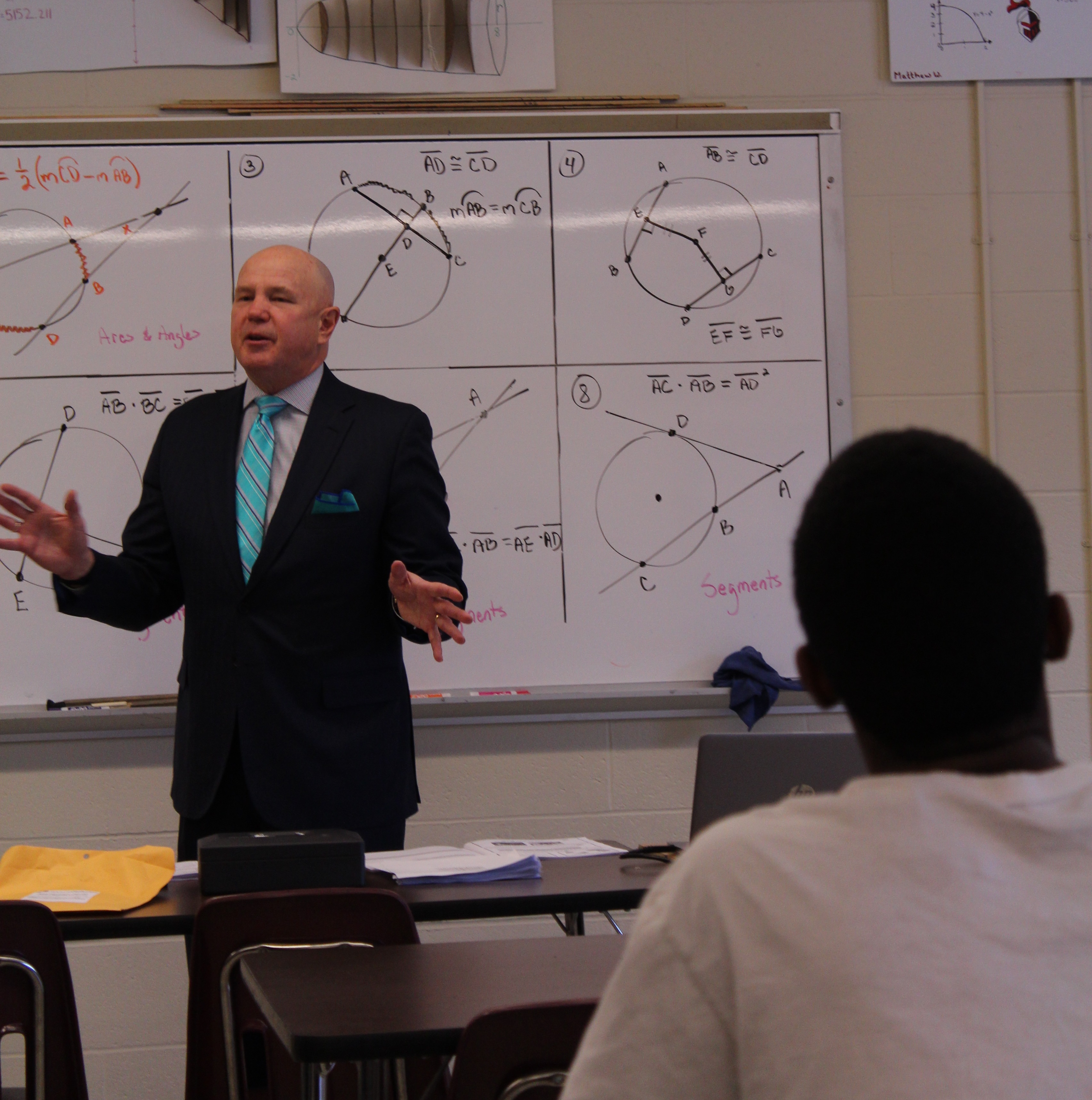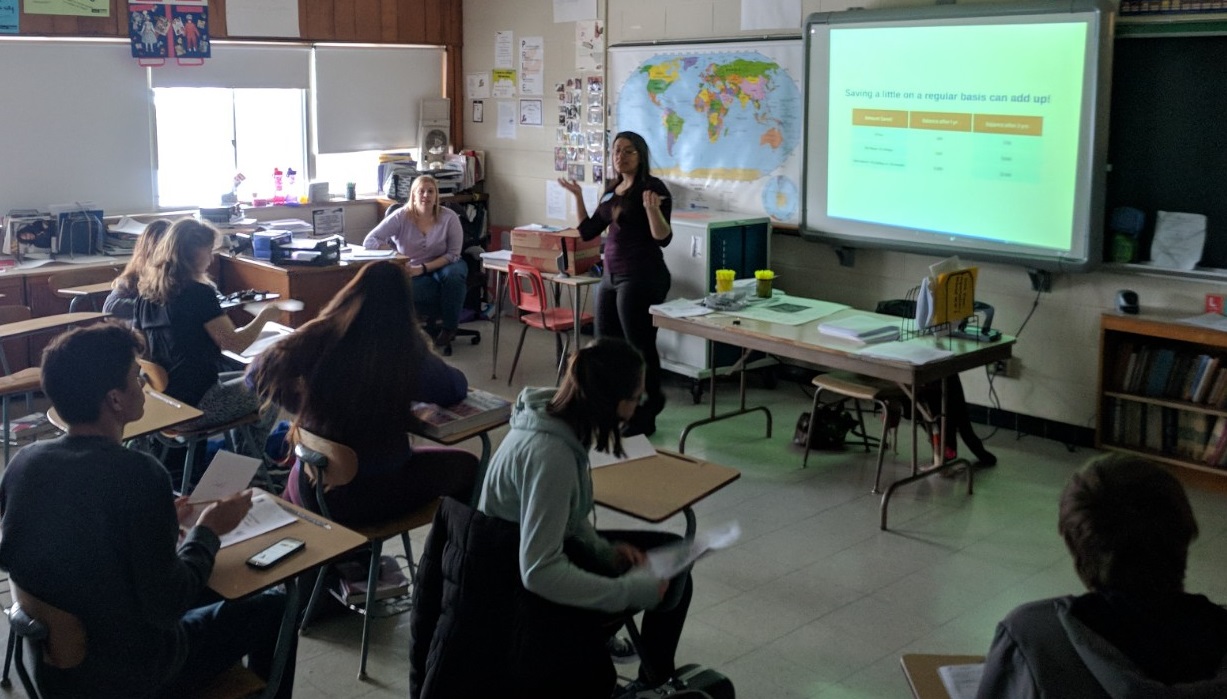Debt and groceries, paychecks and entrepreneurship: a comprehensive morning of personal finance for La Follette juniors
December 14, 2017

Ryan, a junior at La Follette H.S., put his fears at the feet of Andrew Justus, his Money Sense volunteer: “If you go to college, you might be drowning in debt.”
 Justus (at left) aimed to reassure Ryan and his classmates that education and careers remain within reach, with the right planning. College debt loomed large in student questions and chatter, a generation very much aware of America’s student debt crisis.
Justus (at left) aimed to reassure Ryan and his classmates that education and careers remain within reach, with the right planning. College debt loomed large in student questions and chatter, a generation very much aware of America’s student debt crisis.
For Justus, an investment advisor at Associated Bank, paying for his undergraduate degree at the University of New Mexico meant performing work study jobs for extra money and spending hours applying for scholarships and Pell grants. Alternatively, Justus said his wife primarily relied on loans, and that she continues to carry payments “with interest.”
“If you have to take on loans, you can pay them off. You can even take a scorched Earth policy to pay them off quickly,” Justus suggested to Ryan.
 Personal finance conversations like these reverberated through the splintered wings of the Madison high school during a December weekday morning as hundreds of juniors experienced a second section of our Money Sense program. For the second-straight year, La Follette brought nearly their entire junior class our programs, taught by approximately 17 volunteers, from local leaders at Park Bank, UBS, Associated, CUNA and Prism Wealth Management. The comprehensive partnership is part of a wider push to Madison high school and its district to provide financial literacy to students before graduation.
Personal finance conversations like these reverberated through the splintered wings of the Madison high school during a December weekday morning as hundreds of juniors experienced a second section of our Money Sense program. For the second-straight year, La Follette brought nearly their entire junior class our programs, taught by approximately 17 volunteers, from local leaders at Park Bank, UBS, Associated, CUNA and Prism Wealth Management. The comprehensive partnership is part of a wider push to Madison high school and its district to provide financial literacy to students before graduation.
 In a three-piece suit, accented with an aqua kerchief, UBS financial advisor Mark Pent (at left) paused during his presentation to high school juniors for a confession.
In a three-piece suit, accented with an aqua kerchief, UBS financial advisor Mark Pent (at left) paused during his presentation to high school juniors for a confession.
“I’m made for informercials,” Pent said. “Whatever it is they’re selling, I want to buy.”
Pent was sharing the ways in which budgeting and good behaviors can keep savings plans in check for students long after graduation. At another point, Pent invited students to “be entrepreneurial” with their ideas – a friend of his who started a magazine in college came to mind – as a way to pay for college, workforce training or other goals.
 Down the hall, Jon Lauersdorf, of Park Bank (second picture shown above), started his session by asking the 11 juniors a few informal poll questions. Turns out, half had jobs, most had bank accounts, only one had a car. Lauersdorf invited the class to share ways they’re taking action with their first entries in the financial world.
Down the hall, Jon Lauersdorf, of Park Bank (second picture shown above), started his session by asking the 11 juniors a few informal poll questions. Turns out, half had jobs, most had bank accounts, only one had a car. Lauersdorf invited the class to share ways they’re taking action with their first entries in the financial world.
Amy raised her hand to offer, “I put half my paycheck away for savings.”
In the classroom of Michelle Roe, a social studies teacher, first-time volunteer Marwah Tamim-Koss, of Park Bank (at right), joined Roe in passing along a few day-to-day bits of personal finance advice to 14 students at the end of their session. Things like tracking expenses regularly and making lists before you enter a store.
“And don’t go to the grocery store hungry,” Roe added.
Curious about how Wisconsin high schools and businesses can work together on teen financial empowerment? Contact Kristen Ruhl, our Program Director, to find out how Money Sense may work for you: kristen@securefutures.org or (414) 273-8101
